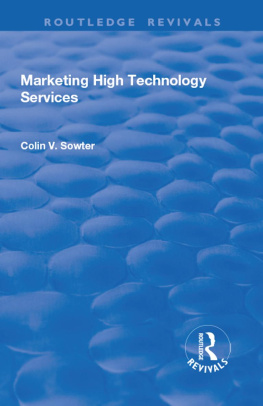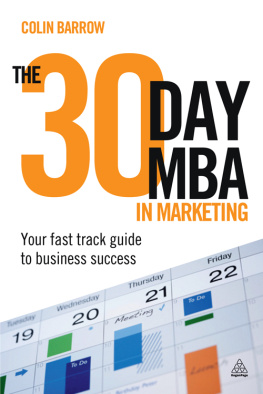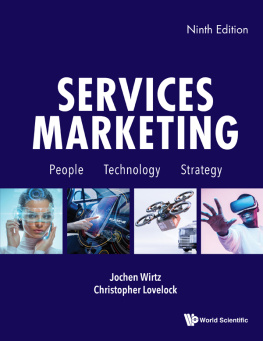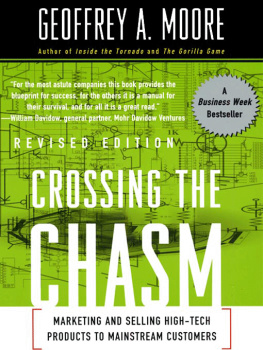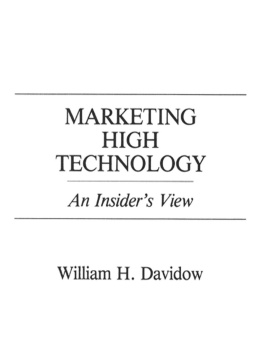MARKETING HIGH TECHNOLOGY SERVICES
MARKETING HIGH TECHNOLOGY SERVICES
Colin V. Sowter
MA (Oxon), D.Phil
First edition published by McGraw-Hill Book Company Europe.
Published 2000 by Gower Publishing
Reissued 2018 by Routledge
2 Park Square, Milton Park, Abingdon, Oxon OX14 4RN
711 Third Avenue, New York, NY 10017, USA
Routledge is an imprint of the Taylor & Francis Group, an informa business
Copyright Colin V Sowter 2000
Colin V Sowter has asserted his right under the Copyright, Designs and Patents Act 1988 to be identified as the author of this work.
All rights reserved. No part of this book may be reprinted or reproduced or utilised in any form or by any electronic, mechanical, or other means, now known or hereafter invented, including photocopying and recording, or in any information storage or retrieval system, without permission in writing from the publishers.
Notice:
Product or corporate names may be trademarks or registered trademarks, and are used only for identification and explanation without intent to infringe.
Publishers Note
The publisher has gone to great lengths to ensure the quality of this reprint but points out that some imperfections in the original copies may be apparent.
Disclaimer
The publisher has made every effort to trace copyright holders and welcomes correspondence from those they have been unable to contact.
Typeset in 10 point Garamond Light by Acom Bookwork, Salisbury, Wiltshire.
A Library of Congress record exists under LC control number: 00024870
ISBN 13: 978-1-138-72538-6 (hbk)
ISBN 13: 978-1-315-19190-4 (ebk)
CONTENTS
1. What Is Marketing?
A Way of Thinking about Business
2. Why Do People Buy?
Value as Perceived by the Customer
3. What Is Involved in Becoming Market Led?
Setting our Sights High
4. To Whom Are We Selling?
Market Definition, Segmentation and Targeting
5. Who Are our Competitors?
Competitive Analysis and Tactics
6. How Do We Set Prices?
An Under-Exploited Management Opportunity
7. How Do We Communicate?
Principles of Communication
8. How Do We Sell?
Personal Communication
9. How Do We Use Impersonal Communications?
Literature, Proposals, Web Sites, Letters, Mailshots, E-Mail, Telephone, Exhibitions, Advertising and Public Relations
10. What Does the Market Want?
Market Research, Marketing Research
11. How Do We Achieve Profitable Innovation?
Market-Led Innovation
12. How Do We Manage the Future?
Market-Based Business Planning

HIGH TECHNOLOGY SERVICES DESERVE HIGH-QUALITY MARKETING
We live in a very competitive market economy. Whether we like it or not, commercial success often comes to those who are better at marketing rather than to those with better technology. Our technological skills need to be complemented by marketing and business skills.
Written by a scientist for scientists, the book is aimed partly at those working full time in marketing or business development departments in high technology service companies, but it is equally valuable for the increasing numbers of scientists, engineers, consultants and other professionals who have to market their own services in organizations with no specialist marketing or business development function. In my experience, even where such a function does exist, the full-time marketing staff are the first to say that they cannot do it all; they need the combined efforts of the whole team. Marketing is too important to be left to the Marketing Department especially if there isnt one!
Readers may be working in scientific research, consultancy, development, project management, software, laboratory testing, engineering services, training, expert witness and countless other types of high technology services. They may be directors, managers or fee-earners. They may work in large companies, small companies or on their own. They may be in organizations which were not formerly regarded as businesses, such as government laboratories, research departments or other internal service providers; usually they are being told that the owners are free to look to outside competitors, and the service providers are required to generate income from third parties.
An important theme developed in the book is that there is profitable business out there for those who have the skills and take the trouble to find it; we cannot wait for clients to come to us. If, as a result of reading the book, readers can win one more contract or justify a higher price in one case, the investment will have paid for itself many times over.
THE AUTHOR
I am not an academic, and this is not a theoretical study of marketing. It represents the fruit of 40 years experience in a wide variety of companies. The lessons come from seeing marketing performed well and badly under UK, American and continental management styles. This has involved working in seven marketing positions, three of them at board level; wrestling with the role of marketing in the organization from a general management perspective; marketing the commercial services of the technological faculties of a university; running programmes for scientists and engineers in which they learn the basics of marketing; helping such people to prepare and present business plans to senior management in order to justify their very existence in the organization. For the last ten years I have had to market my own professional services in a highly competitive field. It is through these experiences that I have learned the lessons that I am seeking to share through the medium of Marketing High Technology Services.
This book is based on a previous edition, Marketing for the Non-Marketing Manager, originally published by McGraw-Hill but now out of print. The text has been specifically adapted to relate to the marketing of high technology services.
A MISUNDERSTANDING ABOUT MARKETING
To many people, marketing is little more than communication. They receive a wide variety of communications by post, telephone, e-mail, fax, television, advertising and so on. This must be what marketing is about, and therefore they had better start doing some of these things!
The danger is that they confuse the vehicle with the message that the vehicle is intended to communicate. There is no point in having an expensive vehicle if it is carrying the wrong goods! People assume that if they pay enough to have an advertisement written or a brochure designed, all will be well. What they forget is that they are probably the only people who can create the right message by thoroughly understanding the needs of the client and the way those needs can be met. This is particularly true when what we are offering is an intangible service. There may well be a role for outside experts in communication, but we dare not delegate the creation of the message to people who are not able to understand it.







